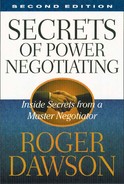Chapter 32
Negotiating Principles: Concentrate on the Issues
Power Negotiators know that they should always concentrate on the issues and not be distracted by the actions of the other negotiators. Have you ever watched tennis on television and seen a highly emotional star like John McEnroe jumping up and down at the other end of the court. You wonder to yourself, “How on Earth can anybody play tennis against somebody like that? It’s such a game of concentration, it doesn’t seem fair.”
The answer is that good tennis players understand that only one thing affects the outcome of the game of tennis. That’s the movement of the ball across the net. What the other player is doing doesn’t affect the outcome of the game at all, as long as you know what the ball is doing. So in that way, tennis players learn to concentrate on the ball, not on the other person.
When you’re negotiating, the ball is the movement of the goal concessions across the negotiating table. It’s the only thing that affects the outcome of the game; but it’s so easy to get thrown off by what the other people are doing, isn’t it?
![]()
Losing Perspective in a Large Transaction
I remember once wanting to buy a large real estate project in Signal Hill, California that comprised eighteen four-unit buildings. I knew that I had to get the price far below the $1.8 million that the sellers were asking for the property, which was owned free and clear by a large group of real estate investors. A real estate agent had brought it to my attention, so I felt obligated to let him present the first offer, reserving the right to go back and negotiate directly with the sellers if he wasn’t able to get my $1.2 million offer accepted.
The last thing in the world the agent wanted to do was present an offer at $1.2 million—$600,000 below the asking price—but finally I convinced him to try it and off he went to present the offer. By doing that, he made a tactical error. He shouldn’t have gone to them; he should have had them come to him. You always have more control when you’re negotiating in your power base than if you go to their power base.
He came back a few hours later, and I asked him, “How did it go?”
“It was awful, just awful. I’m so embarrassed.” He told me. “I got into this large conference room, and all of the principals had come in for the reading of the offer. They brought with them their attorney, their CPA, and their real estate broker. I was planning to do the silent close on them.” (Which is to read the offer and then be quiet. The next person who talks loses in the negotiations.) “The problem was, there wasn’t any silence. I got down to the $1.2 million and they said: ‘Wait a minute. You’re coming in $600,000 low? We’re insulted.” Then they all got up and stormed out of the room.
I said, “Nothing else happened?”
He said, “Well, a couple of the principals stopped in the doorway on their way out, and they said: ‘We’re not gonna come down to a penny less than $1.5 million.’ It was just awful. Please don’t ever ask me to present an offer that low again.”
I said, “Wait a minute. You mean to tell me that, in five minutes, you got them to come down $300,000, and you feel bad about the way the negotiations went?”
![]()
See how easy it is to be thrown off by what the other people are doing, rather than concentrating on the issues in a negotiation. It’s inconceivable that a full-time professional negotiator, say an international negotiator, would walk out of negotiations because he doesn’t think the other people are fair. He may walk out, but it’s a specific negotiating tactic, not because he’s upset.
Can you imagine a top arms negotiator showing up in the White House, and the President saying, “What are you doing here? I thought you were in Geneva negotiating with the Russians.”
“Well, yes, I was, Mr. President, but those guys are so unfair. You can’t trust them and they never keep their commitments. I got so upset, that I just walked out.” Power Negotiators don’t do that. They concentrate on the issues, not on the personalities. You should always be thinking, “Where are we now, compared to where we were an hour ago or yesterday or last week?”
Secretary of State Warren Christopher said, “It’s okay to get upset when you’re negotiating, as long as you’re in control, and you’re doing it as a specific negotiating tactic.” It’s when you’re upset and out of control that you always lose.
That’s why salespeople will have this happen to them. They lose an account. They take it in to their sales manager, and they say, “Well, we lost this one. Don’t waste any time trying to save it. I did everything I could. If anybody could have saved it, I would have saved it.”
So, the sales manager says, “Well, just as a public relations gesture, let me give the other side a call anyway.” The sales manager can hold it together, not necessarily because he’s any brighter or sharper than the salesperson, but because he hasn’t become emotionally involved with the people the way the salesperson has. Don’t do that. Learn to concentrate on the issues.
